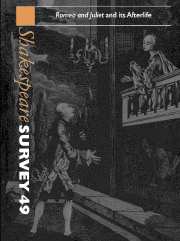Book contents
- Frontmatter
- The Challenges of Romeo and Juliet
- The Date and the Expected Venue of Romeo and Juliet
- The ‘Bad’ Quarto of Romeo and Juliet
- Shakespeare’s Romeo and Juliet: The Places of Invention
- ‘Death-marked love’: Desire and Presence in Romeo and Juliet
- Carnival and Death in Romeo and Juliet: A Bakhtinian Reading
- Ideology and the Feud in Romeo and Juliet
- Bawdy Puns and Lustful Virgins: The Legacy of Juliet’s Desire in Comedies of the Early 1600s
- Picturing Romeo and Juliet
- Nineteenth-Century Juliet
- ‘O, what learning is!’ Pedagogy and the Afterlife of Romeo and Juliet
- The Film Versions of Romeo and Juliet
- The Poetics of Paradox: Shakespeare’s Versus Zeffirelli’s Cultures of Violence
- ‘Lawful deed’: Consummation, Custom, and Law in All’s Well That Ends Well
- ‘Have you not read of some such thing?’ Sex and Sexual Stories in Othello
- French Leave, or Lear and the King of France
- The Actor as Artist: Harold Hobson’s Shakespearian Theatre Criticism
- Shakespeare Performances in England, 1994–1995
- Professional Shakespeare Productions in the British Isles, January-December 1994
- Critical Studies
- Shakespeare’s Life, Times, and Stage
- Editions and Textual Studies
- Books Received
- Index
‘Have you not read of some such thing?’ Sex and Sexual Stories in Othello
Published online by Cambridge University Press: 28 March 2007
- Frontmatter
- The Challenges of Romeo and Juliet
- The Date and the Expected Venue of Romeo and Juliet
- The ‘Bad’ Quarto of Romeo and Juliet
- Shakespeare’s Romeo and Juliet: The Places of Invention
- ‘Death-marked love’: Desire and Presence in Romeo and Juliet
- Carnival and Death in Romeo and Juliet: A Bakhtinian Reading
- Ideology and the Feud in Romeo and Juliet
- Bawdy Puns and Lustful Virgins: The Legacy of Juliet’s Desire in Comedies of the Early 1600s
- Picturing Romeo and Juliet
- Nineteenth-Century Juliet
- ‘O, what learning is!’ Pedagogy and the Afterlife of Romeo and Juliet
- The Film Versions of Romeo and Juliet
- The Poetics of Paradox: Shakespeare’s Versus Zeffirelli’s Cultures of Violence
- ‘Lawful deed’: Consummation, Custom, and Law in All’s Well That Ends Well
- ‘Have you not read of some such thing?’ Sex and Sexual Stories in Othello
- French Leave, or Lear and the King of France
- The Actor as Artist: Harold Hobson’s Shakespearian Theatre Criticism
- Shakespeare Performances in England, 1994–1995
- Professional Shakespeare Productions in the British Isles, January-December 1994
- Critical Studies
- Shakespeare’s Life, Times, and Stage
- Editions and Textual Studies
- Books Received
- Index
Summary
Why does Othello suddenly abandon his affectionate trust in Desdemona for a conviction of betrayal? This question, by placing the protagonist’s understanding at the play’s centre, takes us back to Bradley’s first words about the play in Shakespearean Tragedy: ‘the character of Othello is comparatively simple, but . . . essentially the success of Iago’s plot is connected with this character. Othello’s description of himself as “one not easily jealous” . . . is perfectly just. His tragedy lies in this – that his whole nature was indisposed to jealousy, and yet . . . unusually open to deception’. Bradley has long been discredited – a story with which we are all familiar. In 1933 L. C. Knights’s ‘How Many Children Had Lady Macbeth?’ repudiated the notion of treating dramatic characters as the authors and origins of their own histories, autonomous agents with lives outside the dramatic action. Knights’s essay coincided with a redirection of Shakespeare studies from character to language, from the ‘whole nature’ of the protagonist to the coherent artifice of the play itself. Wilson Knight’s ‘spatial hermeneutics’ figures notably in this move away from Bradley, as part of a ‘modernist paradigm’; psychological integrity is fragmented into linguistic patterns that re-achieve wholeness in a self-reflexive rather than representational text.
- Type
- Chapter
- Information
- Shakespeare Survey , pp. 201 - 216Publisher: Cambridge University PressPrint publication year: 1996
- 2
- Cited by



